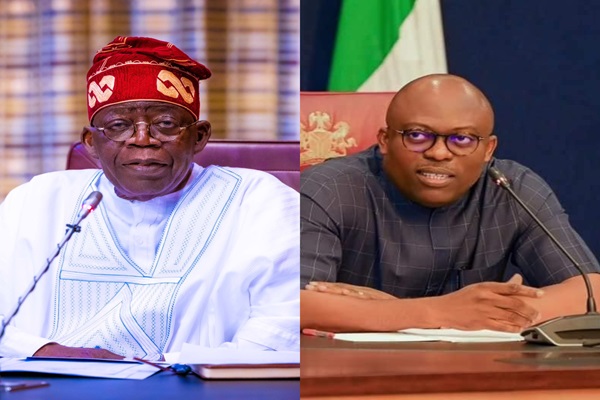
Conflicts in the oil-rich nation of Nigeria After weeks of political unrest and demonstrations, Rivers State might be coming to an end as President Bola Tinubu and Governor Siminalayi Fubara engaged in tactful diplomacy that could change the region’s leadership.
Two of President Tinubu’s advisers told The Africa Report that the president had a secret meeting last week with Governor Fubara, who was suspended on March 18, 2025.
According to reports, Governor Fubara, who has been keen to return to power since the president proclaimed a state of emergency in Rivers State, organized the meeting, which was held in London soon after Tinubu returned from Paris.
“It’s true. Last week, the president and Governor Fubara met in private. Fubara has pledged to make some concessions. His ban would likely be removed before the six-month limit, according to ongoing negotiations, a presidential adviser told The Africa Report, speaking on condition of anonymity.
In an attempt to curry favor with the president, Fubara is also allegedly ready to joining the ruling All Progressives Congress (APC), which might improve the APC’s chances in Rivers State. “The president’s chances of winning Rivers State are significantly higher if Fubara joins the APC,” the aide said.
However, Nyesom Wike, Fubara’s estranged political godfather and the current Minister of the Federal Capital Territory, was reportedly not present for the meeting because he feels uneasy about the behind-the-scenes conversations. To address the state’s ongoing crisis, however, Tinubu is anticipated to arrange a meeting between lawmakers from Rivers State, Fubara, and Wike.
Read Also: Oluremi Tinubu Partners with Leadership Newspaper to Empower Two Million Nigerians
On March 18, President Tinubu suspended Fubara in response to the burst of two oil pipelines, which sparked the political unrest in Rivers State. Security sources attributed the explosion to a conflict between 27 Wike-aligned state politicians and Fubara. Under the influence of Wike, these parliamentarians attempted to remove the governor from office on grounds of purported constitutional violations, including charges pertaining to the bombing of the state parliament building.
In order to stop more instability, President Tinubu’s administration chose to impose a state of emergency in Rivers State, since oil money accounts for almost 60% of Nigeria’s government income and 90% of its foreign exchange. Ibok-Ete Ibas, the former head of the navy, was given full governorship authority when Tinubu designated him as Rivers State’s only administrator.
The media, the opposition, organized labor, and the Nigerian Bar Association were among those who criticized the proclamation. Before the 2027 election, prominent opposition leader and former vice president Atiku Abubakar referred to the action as a “power grab.” Despite having previously denounced a similar move by President Olusegun Obasanjo in 2005, Tinubu defended his decision, claiming that he had the constitutional authority to proclaim a state of emergency. The Nigerian parliament later approved the proclamation.